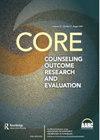定量咨询研究中缺失数据的处理
引用次数: 22
摘要
虽然咨询研究人员使用的许多统计程序需要完整的数据集,但缺失数据的问题代表了必须克服的常见分析障碍。通常,咨询研究人员使用列表删除来解决丢失数据的问题;然而,这种方法在统计上有一些缺点(例如,不必要地降低统计能力和无意中引入偏差)。最新版本的统计软件包,如SPSS,现在包括更强大的输入程序来处理丢失的数据。然而,在没有彻底了解这些程序的使用条件的情况下使用任何删除或插入程序可能会对研究结果产生负面影响。在这篇文章中,策略检测缺失机制和适当处理缺失数据使用删除和插入可用的程序在SPSS进行了讨论。具体程序包括列表删除,两两删除,均值替换,期望最大化,热甲板,多重输入线性回归和预测均值匹配。本文章由计算机程序翻译,如有差异,请以英文原文为准。
Addressing Missing Data in Quantitative Counseling Research
Abstract Although many statistical procedures that are utilized by counseling researchers require complete datasets, the problem of missing data represents a common analysis hurdle that must be overcome. Typically, counseling researchers address the problem of missing data using listwise deletion; however, this procedure has some statistical disadvantages (e.g., unnecessary reduction in statistical power and unintentional introduction of bias). The most recent versions of statistical packages such as SPSS now include more robust imputation procedures for dealing with missing data. However, utilizing any deletion or imputation procedures without a thorough understanding of the conditions in which these procedures should be used could negatively impact study findings. In this article, strategies for detecting missingness mechanisms and appropriately handling missing data using deletion and imputation available procedures in SPSS are discussed. The specific procedures reviewed include listwise deletion, pairwise deletion, mean substitution, expectation-maximization, hot deck, multiple imputation linear regression, and predictive mean matching.
求助全文
通过发布文献求助,成功后即可免费获取论文全文。
去求助
来源期刊

Counseling Outcome Research and Evaluation
Psychology-Psychology (all)
CiteScore
4.50
自引率
0.00%
发文量
11
期刊介绍:
Counseling Outcome Research and Evaluation (CORE) provides counselor educators, researchers, educators, and other mental health practitioners with outcome research and program evaluation practices for work with individuals across the lifespan. It addresses topics such as: treatment efficacy, clinical diagnosis, program evaluation, research design, outcome measure reviews. This journal also serves to address ethical, legal, and cultural concerns in the assessment of dependent variables, implementation of clinical interventions, and outcome research. Manuscripts typically fall into one of the following categories: Counseling Outcome Research: Treatment efficacy and effectiveness of mental health, school, addictions, rehabilitation, family, and college counseling interventions across the lifespan as reported in clinical trials, single-case research designs, single-group designs, and multi- or mixed-method designs.
 求助内容:
求助内容: 应助结果提醒方式:
应助结果提醒方式:


